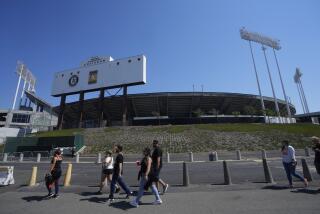As Usual, It’s Difficult to Figure Out Raiders
A day after the Raiders were awarded a new trial in their $1.2-billion lawsuit against the NFL over the rights to the Los Angeles market, representatives of the Coliseum and Rose Bowl had vastly different reactions.
“There’s no denying the fact that this impacts any group’s pursuit of the return of football to the L.A. market,” Los Angeles City Councilman Mark Ridley-Thomas, chairman of a Coliseum Commission task force aimed at bringing NFL football back to that stadium, said Tuesday. “We believed that this had been settled. Obviously, it was not. There remains a substantial open issue.”
But John Moag, who is leading the charge to bring pro football to the Rose Bowl, said he remains “extremely optimistic” about the chances of that happening and said he doesn’t expect the Raider case to have much bearing on the future of football in L.A.
“I don’t know that the judge’s decision has anything to do at all with the progression of the return of football to L.A.,” said Moag, chairman of a Maryland sports investment-banking firm who cleared the way for the Cleveland Browns’ move to Baltimore. “It has nothing to do with our moving forward and putting a team in L.A.”
Bill Thomson, chairman of the Rose Bowl’s tenant-recruitment committee, recently made it clear that stadium officials have no interest in trying to woo the Raiders, who left L.A. for Oakland after the 1994 season.
Asked Monday about the decision to award a new trial, NFL Vice President Joe Browne said the league was “disappointed.”
On Tuesday, league spokesman Greg Aiello declined to make further comment on the situation.
Ridley-Thomas said underestimating the courtroom acumen of Raider owner Al Davis is risky at best. “Even in Al Davis’ advanced years, he’s warming up to pin back Roger Goodell’s ears,” the councilman said, referring to the league’s chief operating officer who oversees all stadium-related matters.
“This not good news for the NFL, nor is it good news for the L.A. market,” he continued. “The NFL blew its opportunity to settle all this when it could have in 1999, when the opportunity for a franchise was much more clear and you had motivated parties ready to step up.”
More to Read
Go beyond the scoreboard
Get the latest on L.A.'s teams in the daily Sports Report newsletter.
You may occasionally receive promotional content from the Los Angeles Times.











